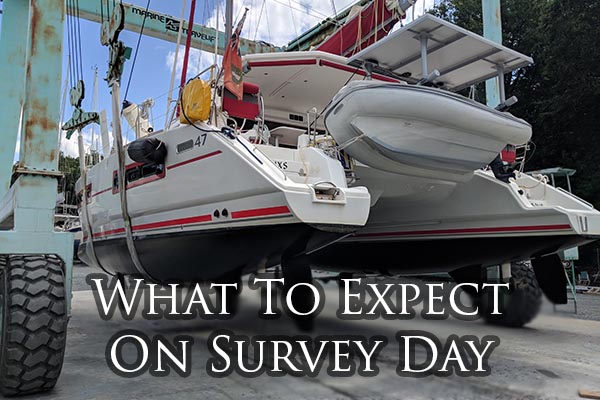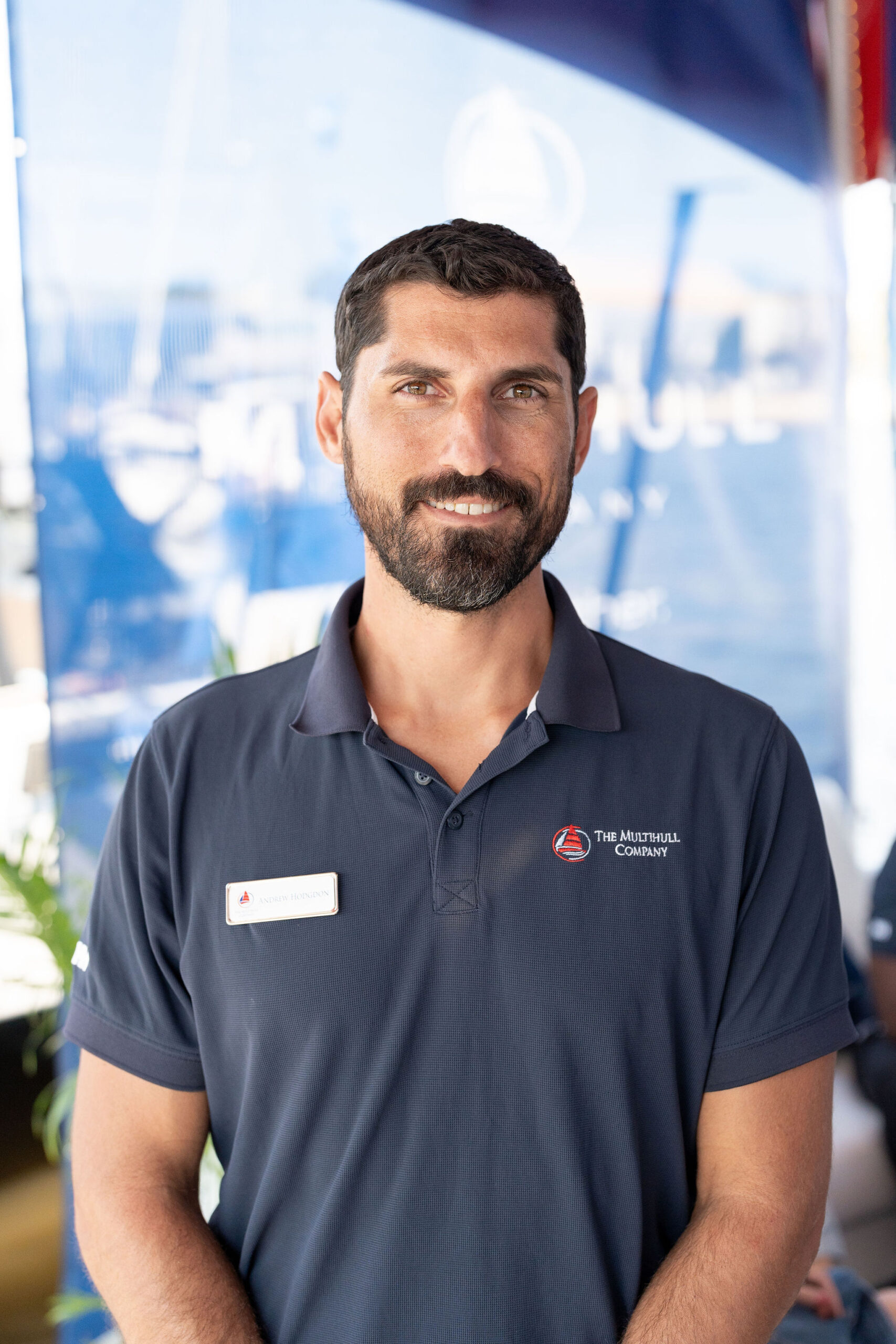Story by Andrew Hodgdon / May 12, 2020

One of the most frequent questions I get from first time boat buyers is “What should I expect during the survey?” This is a very good question that addresses one of the most important steps of the boat purchase process. The survey is your opportunity to perform due diligence to determine the current condition of the vessel, find any damage or deficiencies, and get a sense of the scope of possible repairs or updates the boat may need.
The preparation for survey begins after you have found a specific catamaran that meets your criteria and negotiated a price with the seller. Once the buyer and the seller have both signed a Purchase and Sale Agreement, and a deposit has been received into escrow, then the boat is officially “under contract”. The deposit, usually 10% of the purchase price, is fully refundable until the boat is accepted following this due diligence period.
Arranging the survey and sea trial is the most important aspect of due diligence and can often be logistically complicated. There are several parties that will want to attend the survey including the buyer, buyer’s broker, the seller, the seller’s broker, the surveyor, and possibly the seller’s hired captain to operate the vessel. These parties must all coordinate to be available on a day in which the local boatyard has availability to haul the vessel out of the water. The planning can sometimes turn into a juggling act but your broker will handle most of the logistics and scheduling.
As the buyer, it is your responsibility to choose a credible surveyor that has experience with the type of vessel you intend to survey. Not every surveyor is qualified to survey a catamaran. Your Broker should provide you with a list of qualified surveyors in the location of purchase. It is then up to you to vet those various surveyors and determine which one will be available and will meet your needs. The broker cannot hire or choose the surveyor for you due to possible conflicts of interest, but a good broker will have worked with many surveyors over the years and can make recommendations on who they feel might be the best fit for the specific boat you wish to survey.
Survey day will usually start fairly early in the morning. The surveyor will go straight to work on the in-water inspections of the vessel. He will lift floorboards, open cabinets, crawl through bilges, and look at every nook and cranny of the vessel. He will check the functionality of all systems onboard and determine their condition. He will moisture test the entire deck and cockpit looking for evidence of water intrusion or soft spots. A thorough surveyor may even go up the rig. During this time, you are encouraged to follow the surveyor on his inspection and ask any questions you might have. They will usually be giving you a running commentary about what they are doing and sharing with you some of their findings. It can be a very enlightening experience for you to learn not only about the specific condition of your potential purchase, but also about boat construction and design in general.
Following the in-water inspection, it is time to leave the dock and commence the sea trial. The surveyor will take this opportunity to do an in-depth engine inspection. He will look for leaks, check operating temperature, check throttle and transmission function, etc. One especially important check they will perform is to run the engines through their entire RPM range and look for abnormalities. What speed is the boat making at max efficiency? What about at full RPM? Is there smoke or vibration? The engines can represent a costly aspect of potential deficiencies so your surveyor will spend an appropriate amount of time checking them. They will also take the opportunity during the sea trial to raise the sails. Usually the sea trial will include a short sail, just tacking a couple times and performing a couple reaches if the wind is cooperating. The point is to make sure all the running rigging, winches, furlers, etc are functioning as they should. Unless you are buying a performance vessel and the sale is dependent on the vessel proving its sailing qualities, don’t expect an extended sailing experience. You’re not out there for a booze cruise after all! Finally, the surveyor will check all the instruments and systems that can only function properly while the boat is underway.
On most surveys, you will use the sea trial as an opportunity to make your way over the boatyard for haul out. Once the boat is lifted out of the water, the surveyor will do a thorough inspection of the hull, running gear, and rudders. He will bring out the moisture meter again and look carefully for signs of osmosis. He will check clearances and look for play in the props and rudders. He will also look for evidence of grounding in the daggerboards or keels. The saildrives and thu-hulls will all be carefully inspected. This part of the survey usually only takes an hour or two but it can be the time that major problems reveal themselves. It is therefore one of the most important parts of a comprehensive survey, and one that we would certainly recommend completing. Once the out-of-water inspection is complete, the boat is then splashed and returned to the marina where the day began.
Upon return to the marina, the surveyor may tie up a couple loose ends. They’ll make sure they have photographed all the relevant equipment and reviewed all the necessary registration documents. Once the inspection is complete, most surveyors will offer to sit down with the buyer and their broker to discuss an overview of their findings. This will be your opportunity to ask any final questions and address any concerns. Leaving the survey, you will have a very good understanding of the overall condition of the vessel and what to expect on the written survey report.
It usually takes 2 or 3 days before you receive the survey report. If deficiencies were found during the survey, this is the opportunity to potentially negotiate further concessions from the seller. There are of course considerations that you will want to keep in mind when approaching these negotiations. Did you contract the boat for top market value or did the seller agree to sub-market value sales price on a more “as-is” approach to the sale? If you have contracted the boat for top value, you will want to be a little tougher during post survey negotiations. If you are getting a “deal” on the sales price, you may want to be a little more forgiving post-survey. Generally, we can find a way to meet in the middle where both parties are satisfied and can compromise on a solution. Often this means knocking a certain amount of money off the contract price or the seller agreeing to remedy the issues before closing of the deal is complete. It is rare that a deficiency is found during the survey that ruins the deal but, if there is a major structural issue that jeopardizes the value or seaworthiness of the vessel, you cannot be afraid to walk away. The key is knowing which issues are “deal breakers”, which require concessions, and which are not worth arguing over. Your broker should advise you on the things that should be concerning and the issues that are basically superficial or inexpensive to remedy.
Finally, you accept the vessel and we move on to the process of closing the sale. At this point you will feel very confident that you have an understanding of the condition of your new catamaran. You may have also gained some valuable insight into the operation of your new boat and its systems. Our goal at The Multihull Company is to ensure all our clients have a painless and very informative purchase process of their new catamaran. We pride ourselves on sharing our substantial knowledge of catamarans and we will remain a resource for you throughout the ownership of your vessel.

Awesome company that worked as my brokerage on purchasing out FP catamaran. A special shoutout to Will Miller for walking us through the process
The process of selling our boat was made very smooth by the Multihull Company and Andrew Hodgdon in particular. Andrew helped us navigate the selling process including moving our boat from Grenada to Florida to execute the sale. We would recommend working with this company, and Andrew Hodgdon in particular, without hesitation.
Very smooth process. Chuck was great and very knowledgeable about the whole process. Im happy to have had TMC to take care of all the things i didnt know about.
Andy
We feel like we got tremendous service from Chuck. He is a total professional, knowledgeable, confident and a natural salesman. While I’m really sad to give up the boat, we are compl we are completely satisfied that Chuck sold it for us.
The Multihull Company-St Augustine, and in particular Andrew Hodgdon handled the sale of my Balance 442 Catamaran. Andrew was professional, transparent and a pleasure to do business with.
Successful relationships cannot exist without it. At The Multihull Company we base every relationship on a firm commitment to earning and retaining our client’s trust.
Advice of any kind is valuable only when grounded in hard-won expertise. It too, must be trustworthy. Trust and expertise define the heart and soul of The Multihull Company. We are a team of skilled professionals who thrive on providing expert, trustworthy advice and service to catamaran and trimaran sailors around the globe.
Read More